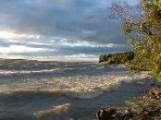Students' research helps fight greenhouse gases
Canada's commitment to reducing greenhouse gases received a boost from work done by a trio of students doing a summer research project with the Lake Simcoe Naturalists' Club and Zephyr Society of Lake Simcoe.
They spend two months studying environmental features in Georgina and the impact on the Lake Simcoe watershed.
The project was funded by Human Resources and Skills Development Canada and some of the findings will be used in the province's Greenlands Strategy as well as the federal government's Kyoto Accord commitments.
Dawn Cowling, 23, Robert Chan, 20 and Charis Agnello, 17, started their work locating, identifying and chronicling birds by sight and sound and noting the location of breeding areas. That information represents the fifth and final year of work for the Ontario Bird Breeding Atlas.
Among their findings was a broadwinged hawk outside of its normal range, a scarlet tanager and osprey nesting areas. Part of the project included working with Wilfrid Laurier University professor Dr. Rob Milne and naturalists club president Paul Harpley.
"He (Dr. Milne) could identify any bird by its song. Pretty amazing," Ms Cowling said.
They evaluated the condition of several forested areas, spotted a rare black maple and conducted public information sessions, their last as the project ended last week at Jackson's Point beach.
They said they were often amazed at how little people knew about the environment and the precarious state of Lake Simcoe.
"It's like they think the environment is there for their enjoyment, and someone else is going to take care of the problems," Ms Cowling said.
"They really take the lake for granted," Charis added.
Charis' project involved identifying wildflowers and vegetation in a rapidly disappearing prairie area, where she spotted a rare Blazing Star. "Paul was really excited about it," she said. "I enjoyed doing that very much."
Mr. Chan studied the geomorphology and historical landscapes, including noting the location of the lake's old glacial shoreline, aboriginal artifacts and trying to find fossils.
"I really enjoyed working outdoors and doing the hands-on work," he said.
Mapping is important to understanding groundwater, source water protection and the longer term water quality of Lake Simcoe, Mr. Harpley said.
Ms Cowling's other duties included recording data of their findings and designing brochures for the naturalists' club. "I think the birding was my favourite part," she said.
All three said the summer stint with the naturalists has given them a new appreciation of nature they will incorporate into studies and possible career choices after university.
Ms Cowling, from Unionville, is going to teach English overseas, something she did once in Russia, then returning to her alma mater, the University of Guelph, to complete her master's degree in international relations.
Mr. Chan, from Toronto, is a third year student at Guelph taking environmental engineering. He plans to look for a career in a related field and possibly spend time with Engineers Without Borders, volunteering to help developing countries with environmental problems.
Charis, who lives in Pefferlaw, is returning to Sutton District High School for Grade 12. Her career goals aren't set, but she hopes to be back with the naturalists' project next year. Her past summer job was helping out father Joe at Georgina Music in Sutton.
This was the 14th year of the program, kept going through many volunteers hours by Dr. Milne and Mr. Harpley.
"The South Lake Simcoe Naturalists Club's executive members and other volunteers are the backbone of this program but, of course, students hired for the program make it what it is each year," Mr. Harpley said.



